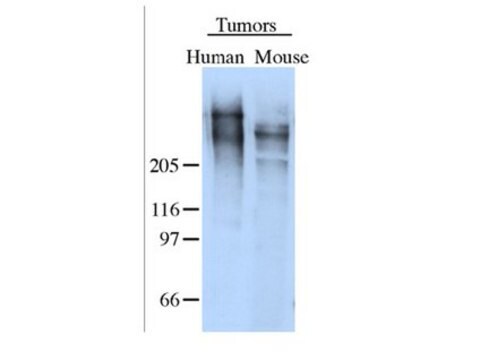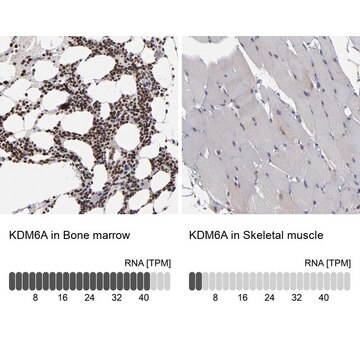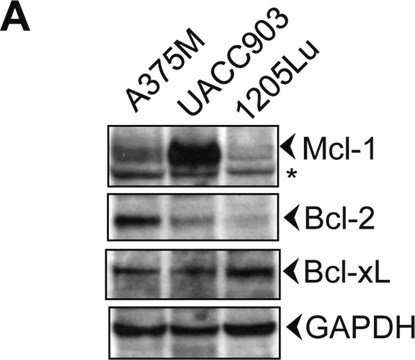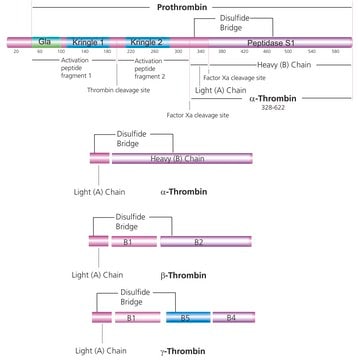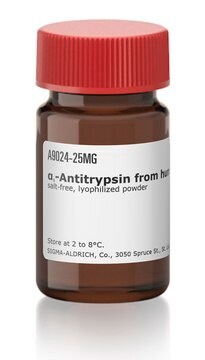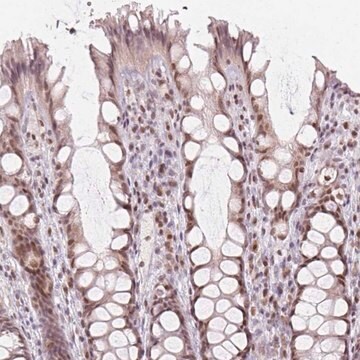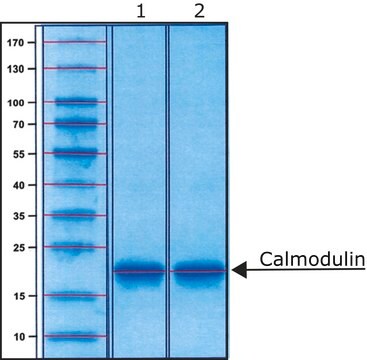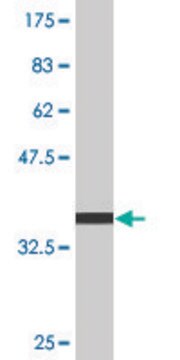ABE1865
Anti-UTX (KDM6A)
from rabbit, purified by affinity chromatography
동의어(들):
Lysine-specific demethylase 6A, Histone demethylase UTX, Ubiquitously-transcribed TPR protein on the X chromosome, Ubiquitously-transcribed X chromosome tetratricopeptide repeat protein
로그인조직 및 계약 가격 보기
모든 사진(1)
About This Item
UNSPSC 코드:
12352203
eCl@ss:
32160702
클론:
polyclonal
application:
ChIP
ICC
IF
IP
WB
ICC
IF
IP
WB
종 반응성:
human, mouse
기술:
ChIP: suitable
immunocytochemistry: suitable
immunofluorescence: suitable
immunoprecipitation (IP): suitable
western blot: suitable
immunocytochemistry: suitable
immunofluorescence: suitable
immunoprecipitation (IP): suitable
western blot: suitable
citations:
2
추천 제품
생물학적 소스
rabbit
Quality Level
항체 형태
affinity isolated antibody
항체 생산 유형
primary antibodies
클론
polyclonal
정제법
affinity chromatography
종 반응성
human, mouse
기술
ChIP: suitable
immunocytochemistry: suitable
immunofluorescence: suitable
immunoprecipitation (IP): suitable
western blot: suitable
NCBI 수납 번호
UniProt 수납 번호
배송 상태
ambient
타겟 번역 후 변형
unmodified
유전자 정보
human ... KDM6A(7403)
일반 설명
Lysine-specific demethylase 6A (UniProt O15550; also known as Histone demethylase UTX, KDM6A, Ubiquitously-transcribed TPR protein on the X chromosome, Ubiquitously-transcribed X chromosome tetratricopeptide repeat protein) is encoded by the KDM6A (also known as KABUK2, UTX) gene (Gene ID 7403) in human KDM6A associates with H3K4 methyltransferase MLL3/4 complex and specifically demethylates Lys-27 of histone H3 and plays a central role in histone code. It is shown to demethylate trimethylated and dimethylated, but not monomethylated H3 Lys-27. KDM6A mediates muscle regeneration through it demethylase activity, while it regulates mdsoderm differentiation of embryonic stem cells and mammary gland development independent of its demethylase activity. KDM6A also plays a potential role in regulating brown adipocyte thermogenic program. It is up-regulated during brown adipocyte differentiation and by cold exposure in both brown and white adipose tissue in mice, indicating its potential role in thermogenesis. Inactivation of KDM6A down-regulates brown fat specific gene expression. Mutations in KDM6A gene are a causative factor in Kabuki syndrome that is characterized by congenital mental retardation, postnatal dwarfism, large prominent earlobes, a cleft or high-arched palate, scoliosis, and other abnormalities.
Ref.:
Lederer, D et al. (2012). Am. J. Hum. Genet. 90, 119-124.
Zha, L et al. (2015). J. Biol. Chem. 290, 25151-25163.
Ref.:
Lederer, D et al. (2012). Am. J. Hum. Genet. 90, 119-124.
Zha, L et al. (2015). J. Biol. Chem. 290, 25151-25163.
특이성
This polyclonal antibody detected the expected UTX target band in wild-type, but not Utx-knockout murine ESC nuclear extract (Faralli, H., et al. (2016). J. Clin. Invest. 126(4):1555-1565).
면역원
His-tagged recombinant fragment within the central region of human UTX (Seenundun, S., et al. (2010). EMBO J. 29(8):1401-1411).
애플리케이션
Anti-UTX (KDM6A), Cat. No. ABE1865, is a highly specific rabbit polyclonal antibody that targets Lysine-specific demethylase 6A and has been tested in Chromatin Immunoprecipitation (ChIP), Immunocytochemistry, Immunofluorescence, Immunoprecipitation, and Western blotting.
Chromatin Immunoprecipitation (ChIP) Analysis: A representative lot detected UTX (KDM6A) recruiment to the Myog, CKm, and Tnnc2 promoters following myogenic differentiation of primary murine myoblasts from wild-type or Utx(KI/KI) female mice harboring homozygous demethylase dead Utx mutant gene knock-in (Faralli, H., et al. (2016). J. Clin. Invest. 126(4):1555-1565).
Chromatin Immunoprecipitation (ChIP) Analysis: A representative lot detected a time-dependent UTX (KDM6A) enrichement at the Myogenin and CKm regulatory regions following myogenic differentiation of murine C2C12 myoblasts. shRNA-mediated Six4 knockdown, but not p38 MAPK inhibition, downregulated UTX (KDM6A) recruitment to the Myogenin and CKm loci (Seenundun, S., et al. (2010). EMBO J. 29(8):1401-1411).
Immunocytochemistry Analysis: A representative lot detected UTX (KDM6A) immunoreactivity by indirect immunofluorescence staining of 1% paraformaldehyde-fixed, 0.5% Triton X-100-permeabilized myofibers isolated from mouse extensor digitorum longus (EDL) muscles (Faralli, H., et al. (2016). J. Clin. Invest. 126(4):1555-1565).
Immunofluorescence Analysis: A representative lot detected UTX (KDM6A) immunoreactivity by indirect immunofluorescence staining of 4% paraformaldehyde-fixed, 1% Triton X-100-permeabilized, transverse OCT cryosections sections of mouse tibialis anterior skeletal muscle (Faralli, H., et al. (2016). J. Clin. Invest. 126(4):1555-1565).
Immunoprecipitation Analysis: A representative lot co-immunoprecipitated PTIP and RbBP5 with UTX using embryonic stem cell (ESC) nuclear extracts from wild-type or Utx(KI/KI) mice harboring homozygous demethylase dead Utx mutant gene knock-in. No UTX/PTIP/RbBP5 complex was precipitated from Utx-knockout ESCs (Faralli, H., et al. (2016). J. Clin. Invest. 126(4):1555-1565).
Immunoprecipitation Analysis: A representative lot co-immunoprecipitated Six4 with UTX (KDM6A) using nuclear extract from murine C2C12 myoblasts 24 hrs post myogenic differentiation (Seenundun, S., et al. (2010). EMBO J. 29(8):1401-1411).
Western Blotting Analysis: A representative lot detected UTX4 in myoblast whole cell lysates and embryonic stem cell (ESC) nuclear extracts from wild-type or Utx(KI/KI) mice harboring homozygous demethylase dead Utx mutant gene knock-in, as well as in UTX and MLL4 immunoprecipitates. No UTX target band was detected in Utx-knockout ESCs (Faralli, H., et al. (2016). J. Clin. Invest. 126(4):1555-1565).
Western Blotting Analysis: A representative lot detected UTX (KDM6A) in nuclear extracts from human K562 and murine C2C12 myoblasts (24 hrs post myogenic differentiation), as well as in Six4 immunoprecipitates. shRNA treatment prior to nuclear extract preparation diminished target band detection (Seenundun, S., et al. (2010). EMBO J. 29(8):1401-1411).
Chromatin Immunoprecipitation (ChIP) Analysis: A representative lot detected a time-dependent UTX (KDM6A) enrichement at the Myogenin and CKm regulatory regions following myogenic differentiation of murine C2C12 myoblasts. shRNA-mediated Six4 knockdown, but not p38 MAPK inhibition, downregulated UTX (KDM6A) recruitment to the Myogenin and CKm loci (Seenundun, S., et al. (2010). EMBO J. 29(8):1401-1411).
Immunocytochemistry Analysis: A representative lot detected UTX (KDM6A) immunoreactivity by indirect immunofluorescence staining of 1% paraformaldehyde-fixed, 0.5% Triton X-100-permeabilized myofibers isolated from mouse extensor digitorum longus (EDL) muscles (Faralli, H., et al. (2016). J. Clin. Invest. 126(4):1555-1565).
Immunofluorescence Analysis: A representative lot detected UTX (KDM6A) immunoreactivity by indirect immunofluorescence staining of 4% paraformaldehyde-fixed, 1% Triton X-100-permeabilized, transverse OCT cryosections sections of mouse tibialis anterior skeletal muscle (Faralli, H., et al. (2016). J. Clin. Invest. 126(4):1555-1565).
Immunoprecipitation Analysis: A representative lot co-immunoprecipitated PTIP and RbBP5 with UTX using embryonic stem cell (ESC) nuclear extracts from wild-type or Utx(KI/KI) mice harboring homozygous demethylase dead Utx mutant gene knock-in. No UTX/PTIP/RbBP5 complex was precipitated from Utx-knockout ESCs (Faralli, H., et al. (2016). J. Clin. Invest. 126(4):1555-1565).
Immunoprecipitation Analysis: A representative lot co-immunoprecipitated Six4 with UTX (KDM6A) using nuclear extract from murine C2C12 myoblasts 24 hrs post myogenic differentiation (Seenundun, S., et al. (2010). EMBO J. 29(8):1401-1411).
Western Blotting Analysis: A representative lot detected UTX4 in myoblast whole cell lysates and embryonic stem cell (ESC) nuclear extracts from wild-type or Utx(KI/KI) mice harboring homozygous demethylase dead Utx mutant gene knock-in, as well as in UTX and MLL4 immunoprecipitates. No UTX target band was detected in Utx-knockout ESCs (Faralli, H., et al. (2016). J. Clin. Invest. 126(4):1555-1565).
Western Blotting Analysis: A representative lot detected UTX (KDM6A) in nuclear extracts from human K562 and murine C2C12 myoblasts (24 hrs post myogenic differentiation), as well as in Six4 immunoprecipitates. shRNA treatment prior to nuclear extract preparation diminished target band detection (Seenundun, S., et al. (2010). EMBO J. 29(8):1401-1411).
Research Category
Epigenetics & Nuclear Function
Epigenetics & Nuclear Function
품질
Evaluated by Western Blotting in HeLa nuclear extract.
Western Blotting Analysis: 0.2 µg/mL of this antibody detected UTX (KDM6A) in 10 µg of HeLa nuclear extract.
Western Blotting Analysis: 0.2 µg/mL of this antibody detected UTX (KDM6A) in 10 µg of HeLa nuclear extract.
표적 설명
~154 kDa observed. 154.2 kDa (human; UniProt O15550) and 154.4/157.5 kDa (mouse isoform 1/2; UniProt O70546) calculated. Uncharacterized bands may be observed in some lysate(s).
물리적 형태
Affinity purified.
Purified rabbit polyclonal antibody in buffer containing 0.1 M Tris-Glycine (pH 7.4), 150 mM NaCl with 0.05% sodium azide.
저장 및 안정성
Stable for 1 year at 2-8°C from date of receipt.
기타 정보
Concentration: Please refer to lot specific datasheet.
면책조항
Unless otherwise stated in our catalog or other company documentation accompanying the product(s), our products are intended for research use only and are not to be used for any other purpose, which includes but is not limited to, unauthorized commercial uses, in vitro diagnostic uses, ex vivo or in vivo therapeutic uses or any type of consumption or application to humans or animals.
적합한 제품을 찾을 수 없으신가요?
당사의 제품 선택기 도구.을(를) 시도해 보세요.
Storage Class Code
12 - Non Combustible Liquids
WGK
WGK 1
시험 성적서(COA)
제품의 로트/배치 번호를 입력하여 시험 성적서(COA)을 검색하십시오. 로트 및 배치 번호는 제품 라벨에 있는 ‘로트’ 또는 ‘배치’라는 용어 뒤에서 찾을 수 있습니다.
Jaclyn Andricovich et al.
Cancer cell, 33(3), 512-526 (2018-03-14)
KDM6A, an X chromosome-encoded histone demethylase and member of the COMPASS-like complex, is frequently mutated in a broad spectrum of malignancies and contributes to oncogenesis with poorly characterized mechanisms. We found that KDM6A loss induced squamous-like, metastatic pancreatic cancer selectively
자사의 과학자팀은 생명 과학, 재료 과학, 화학 합성, 크로마토그래피, 분석 및 기타 많은 영역을 포함한 모든 과학 분야에 경험이 있습니다..
고객지원팀으로 연락바랍니다.